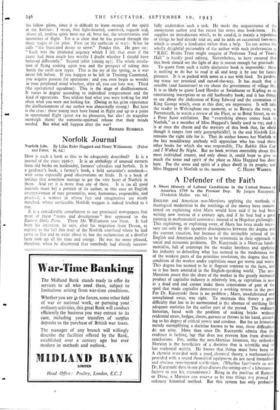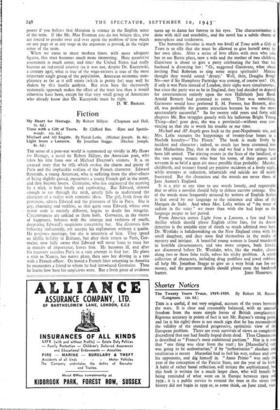A Defender of the Faith
ENGLISH and American neo-Marxians applying the methods of theological modernists to the teachings of the master have concen- trated on explaining what Marx would have said if he had been writing now insteaa of a century ago, and if he had had a good training in mathematical economics instead of in Hegelian philosophy. This explaining, or explaining away, of Marx has been made neces- sary not only by the apparent discrepancies between the dogma and the current situation, but because of the invincible refusal of the English and American publics to be systematic in their approach to social and economic problems. Dr. Kuczynski is a Marxian funda- mentalist, full of contempt for the weaker brethren and applying his industry to. defending what has seemed to the modernists one of the weakest,parts of the primitive revelation, the dogma that the condition of the worker under capitalism must get worse and worse. This dogma has seemed to be in flagrant contrast to the facts, and so it has been amended in the English-speaking world. The neo- Marxians assert that the share of the worker in the greatly increased product of capitalist industry is relatively less, or capitalism is now at a dead end and cannot make those concessions of part of the spoil that made capitalist democracy a working system in the past. For Dr. Kuczynski there is no problem ; Marx, unadulterated and unexplained away, was right. To maintain this theory a great difficulty that has to be surmounted is the absence of anything like adequate statistics for the earlier part of the period. The ordinary historian, faced with the problem of making bricks without evidential straw, hedges, cheats, guesses or throws in his hand, accord. ing to his degree of critical power and candour. But for an historian merely exemplifying a doctrine known to be true, these difficulties do not arise. More than. once Dr. Kuczynski admits that the evidence is lacking, but that does not prevent him from drawing conclusions. For, unlike the non-Marxian historian, the orthodox Marxian is the beneficiary of a doctrine that is scientific and so has evidential weight. He knows that things must have been so. A chemist nrov:ded with a good...chemical theory, a mathematician provided with a sound theoretical equipment do not need immediate and obvious exne-imental ver;fication. (Whether facetiously or not, Dr. Kuczynski does in one place discuss the setting-up of a laboratory- factory to test his accountancy.) Being in the position of Ramsay or Dirac, a Marxian can assu-rie to be true things not proved by ordinary historical method. But this system has only probative
power if you believe that Marxism is science in the English sense of the term. If like Mr. Max Eastman you do not believe this, you are forced to ponder over and over again the problem of how much on any page or at any stage in the argument is proved, in the vulgar sense of the term.
When we come to more modem times. with more adequate figures, this tract becomes much more interesting. Here quantitive assessment is much easier, and since the United States had really become an industrial country (as it was not, despite Dr. Kuczynski, a century ago), what is true of the wage-earners is true of the most important single group of the population. American economic com- placency as far as it still exists (wh:-..13 is pretty far) may well be shaken by this hostile analysis. But even here the excessively systematic approach makes the effect of the tract less than it would otherwise have been, except for that very small group of Americans who already know that Dr. Kuczynski must be right.
D. W. BROGAN.



























 Previous page
Previous page